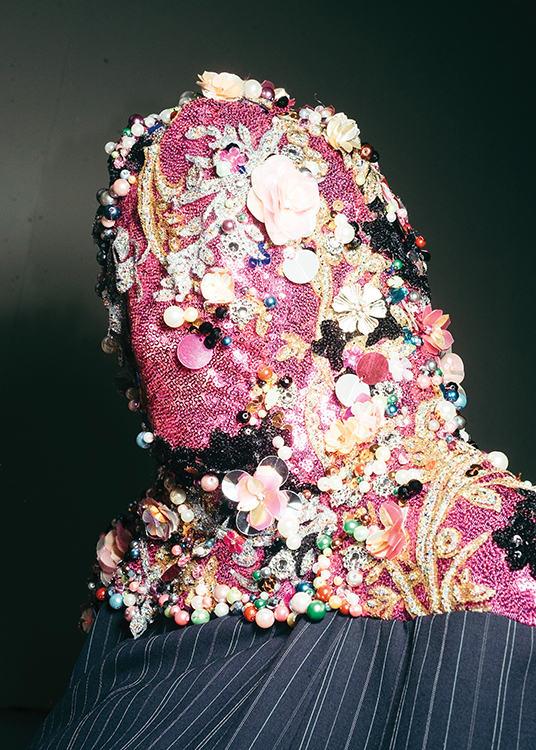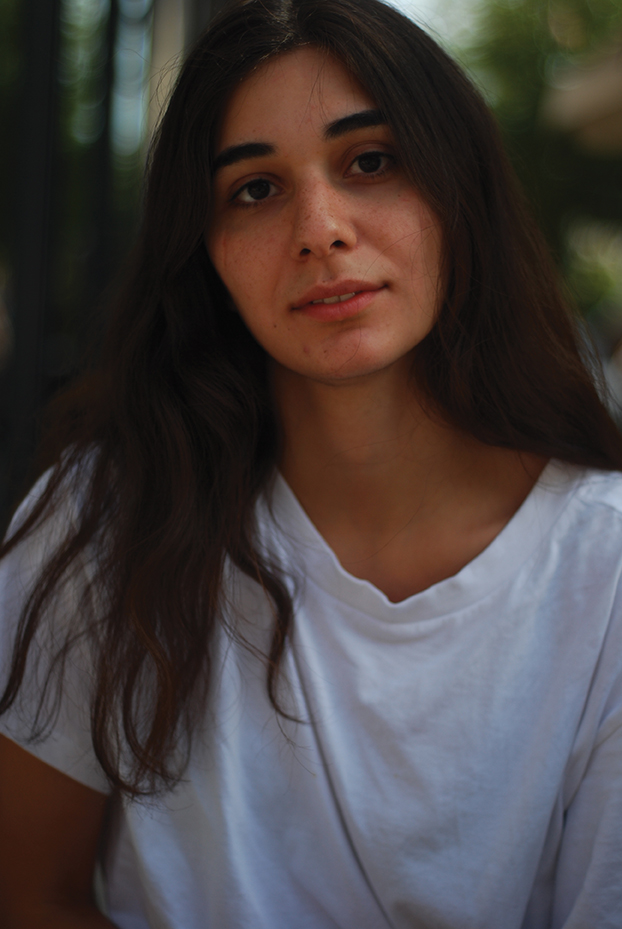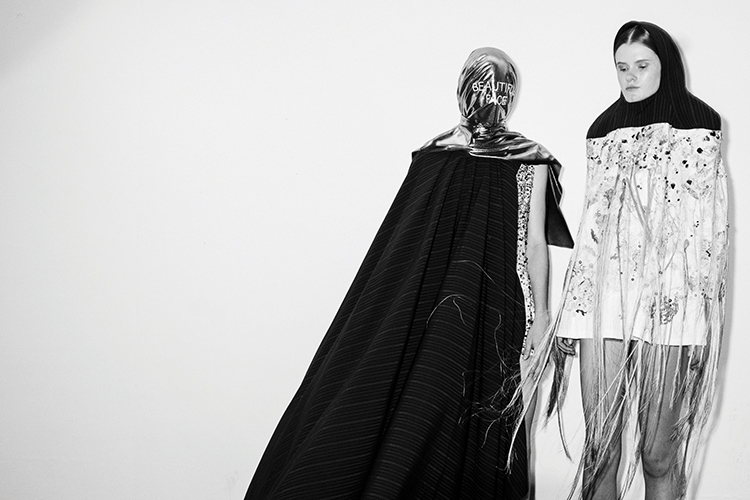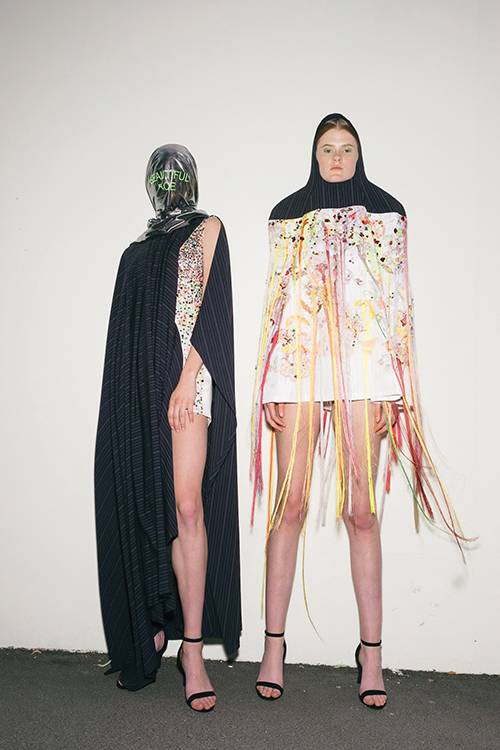Objectification, Censorship, and Global Femaleness

Global transplant Elnaz Gargari doesn’t study fashion because she loves to dress in any certain way. In fact, monochrome staples and unfussy footwear are the uniform for the twenty-three year old fashion scholar because, she’ll tell you, “I just can’t be really creative on myself.”
The attention Elnaz seeks in her pursuit of fashion design is not for herself, but for the messages which she believes fashion has a responsibility and a platform to share. Being raised in Norway and spending her adolescence in Iran has taught Elnaz a great deal about the various ways that fashion is exhibited around the world, the different ways that women’s bodies are displayed or censored around the world, and what it all means for humanity.
It comes as no surprise that Elnaz is behind the winning designs for the Designers’ Nest competition. The Nordic fashion competition takes entrants from many schools across Finland, Iceland, Sweden, Denmark, and Norway including the Oslo National Academy of the Arts, where Elnaz is a student. The judges’ panel for the contest includes prominent fashion talent scouts, editors-in-chief from leading fashion magazines, and designers themselves – people immersed not only in the technical minutiae of fashion, but also the culture it informs and by which it is informed. Said the judges of Elnaz’s winning design:
“The winner has created a collection of borderless fashion that moves across gender and geography. She has interpreted two systems of domination without idolizing or “exoticizing” one over the other. It is a personal and coherent story of a woman reclaiming her body and gaze. It’s an exercise in female power.”
What moves a person to create something so profound and excel among competitors’ designs by creating some-thing described as “refreshing,” “feminist,” and “highly relevant?” We spoke to Elnaz to find out more:

What motivated your winning designs? How did you come up with them?
Inspired by Nezami Ganjavi’s Seven Beauties, I asked myself: “What is beauty?” I wanted to relate that to today’s aesthetic and definition of beauty. Knowing that we get our definitions of beauty from the media, I researched how media portrays women and how images subconsciously affect us. When we look at the history, we understand that media has played a crucial role in defining who we are. Media has always been held by men, which means almost everything you know about yourself, about your country and your world, comes from the male perspective. I connect these issues with a phenomenon called “the male gaze” and the objectification of women.
Iran has made a solution for this by covering women so that they may achieve dignity and respect. However, this is also objectification of women in a whole other way. The pressure to be beautiful still exists so much that there is a high popularity to undergo plastic surgery. By doing more research, I began to learn about censorship. When the media in Iran needs to broadcast or publish something from foreign countries, material must be checked by Iranian authorities to censor what is unsuitable for the people there. Officials use black markers to remove and censor the bodies of women or anything else they deem unfit.
Philip Toledano created a series on Iranian censorship called Portraits of Absence and he explains “The censor, a person whose function it is to erase, becomes the person who makes us see.” But, when something is covered from our eyes, we get more curious about it and it takes more of our attention and imagination.
To make something clear, I am not against women who choose to cover themselves when the decision derives from her personal beliefs. Rather, I am against the act of someone covering someone else against her will.
Media works this way: someone chooses what we see and how something is shown. This is how women get objectified in Western AND Eastern media. Both are a sort of censorship of the true woman and this is the core of my project.

In what way do you think fashion can make a statement about important issues like equality or society as a whole? Why is fashion so important, as an art form?
Fashion is a field which earns attention. Fashion is known for being cruel and unfair. Fashion is not just about visual creation but also the story behind it – the message. I create clothes to tell a story about a fight between tradition and modernity, the interaction of cultures, and why certain norms are determining what we should design.
Who inspires you in the fashion world (designer, photographer, model, etc.) What do you admire about this person?
To be honest, right now I don’t have specific person! I love people who create their own world and people who like to surprise the audience. I really look up to [Designer and British MBE] Hussein Chalayan. Before I started studying fashion, my icon and idol was Alexander McQueen. I still admire his work and always wonder how he thought and created.
How would you describe your own personal style and the clothing you like to wear?
When I read this question, I laughed a bit. My personal style is really boring and dull. I wear simple items; mostly black and white. I always wear sneakers. But I love people who are able to express themselves through their style. I just can’t be really creative on myself. Maybe I just can’t handle the attention.
What’s next for you, Elnaz?
Starting my Master’s degree this fall at Oslo National Academy of the Arts. I am working on other projects. I really want to work with other designers. My final aim is to have my own label and to produce clothing in Iran, with an eye on fair production.
If you could offer young girls across the globe one piece of advice, what would you tell them?
We get told to be ourselves and accept who we are. It sounds easy until you are doubting almost everything about yourself, from your appearance to your skills. We constantly compare ourselves with everyone “better” or “prettier” and we lose hope. If you are in this phase of development – don’t lose the battle. Do not let what you see on Instagram or Snapchat define where you are in life. Stop comparing yourself to others and just focus on your own sh-t.

Text Kayla Naab

